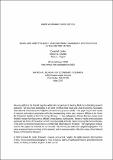| dc.contributor.author | Cutler, David | |
| dc.contributor.author | Glaeser, Edward | |
| dc.contributor.author | Vigdor, Jacob | |
| dc.date.accessioned | 2009-03-17T17:37:18Z | |
| dc.date.issued | 2008 | |
| dc.identifier.citation | Cutler, David, Edward Glaeser, and Jacob Vigdor. When are ghettos bad? Lessons from immigrant segregation in the United States. Journal of Urban Economics 63(3): 759-774. | en |
| dc.identifier.issn | 0094-1190 | en |
| dc.identifier.uri | http://nrs.harvard.edu/urn-3:HUL.InstRepos:2666726 | |
| dc.description.abstract | Recent studies provide conflicting evidence on the connection between ethnic or racial neighborhood segregation and outcomes. Some studies find that residence in an enclave is beneficial, some reach the opposite conclusion, and still others imply that any relationship is small. One hypothesis is that studies differ because the impact of segregation varies across groups, perhaps because its impact is more benign for better-educated groups. This paper presents new evidence on this hypothesis using data on first-generation immigrants in the United States. We confront the endogenous selection into residential enclaves and find that selection into enclave neighborhoods is on balance negative. Correcting for this selection produces positive mean effects of segregation, and a positive correlation between group average human capital and the impact of segregation. | en |
| dc.description.sponsorship | Economics | en |
| dc.language.iso | en_US | en |
| dc.publisher | Elsevier | en |
| dc.relation.isversionof | http://dx.doi.org/10.1016/j.jue.2007.08.003 | en |
| dash.license | LAA | |
| dc.title | When Are Ghettos Bad? Lessons from Immigrant Segregation In the United States | en |
| dc.relation.journal | Journal of Urban Economics | en |
| dash.depositing.author | Cutler, David | |
| dc.identifier.doi | 10.1016/j.jue.2007.08.003 | * |
| dash.contributor.affiliated | Cutler, David | |
| dash.contributor.affiliated | Glaeser, Edward | |


